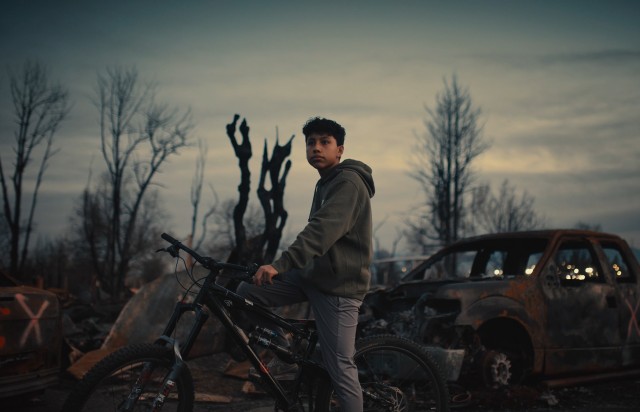Fires, floods, earthquakes, hurricanes, tornados, tsunamis, drought, famine, heat waves. Pick a natural disaster, and there’s a high chance that it’s wreaked havoc on somebody somewhere in the last calendar year. At this point, most news-reading citizens of the world are aware that centuries of overconsumption, fossil fuel abuse, and rampant industrialization have caused the planet to start punching back, and as these disasters increase in frequency, so too does the death, destruction, and displacement that follow in their wake. Paul Hairston’s documentary Almeda examines the aftermath of one of these disasters in an empathetic and non-judgmental way, and takes a closer look at victims who refuse to let their life be dictated by despair.
The film – a moving, poetic portrayal of immigrants uprooted by the 2020 Oregon fires – speaks not only of resilience, but of how the most vulnerable communities are often the ones most affected by disaster. You can read about tragedies in the paper, but there’s an argument to be made that video is the most effective way to make stories like this break through the numbness barrier that can form after being oversaturated with headlines about disastrous events on a weekly basis. And in a year where wildfires have scorched the earth (and dominated the news cycle), this subject matter is inherently relevant.

“In Almeda we wanted to use a visual language that felt motivated, painterly and
observational all at once . . . the visual language attempted to explore a tenderness in the story that never felt intrusive” – dir. Paul Hairston
Director Paul Hairston (Lions in the Corner) highlights the cascading consequences of large-scale tragedy by honing in on the experiences of a select few Oregonians who worked hard to achieve a place of financial stability in society, only to have that sense of safety taken away from them by an out of control wildfire. One man lists a biography that is not uncommon for someone forced to start at the bottom of the economic ladder: he worked for years in the orchards, then moved on to planting trees, and eventually raised enough money to build mobile homes for himself and others, only to see the community he helped build vanish. Another woman talks of a rough childhood that inspired her to provide a safe place for her own children to grow up in, only to lose a home and the stability that came along with it. These stories don’t end on a downbeat note, though. Each person we hear from is dedicated to rebuilding their communities, and beneath the pain, there’s an underlying message of hope, and a desire to give their sons and daughters a better life.
Almeda’s interviewees speak with clarity and purpose, and instead of editorializing other people’s pain or providing too much context, Hairston favors a fly-on-the-wall style that gives the people it depicts an opportunity to speak for themselves. It stands in stark contrast to the kind of shock journalism that loses its edge over time, and though these stories may be full of pain, there’s a drive and determination beneath the surface that ultimately inspires.
In a world where things seem to be falling apart 24/7, it’s easy to lose hope, and non-stop tragic headlines can turn us numb to the pain people go through when their entire life is uprooted in an instant. If you don’t know anyone involved, it can be hard to put yourself in their shoes, and in a way, it may seem prudent to turn off the part of your brain that gets too invested in disaster. But listening to the people featured in this film talk candidly about catastrophe – hearing their voices, seeing what remains of their homes, hearing how they plan to rebuild – reminds us that those most impacted by climate change will continue to persevere and adapt, and that as long as you put in the work, you’ll be able to get through whatever unanticipated disasters life throws at you.

 Adam Banks
Adam Banks